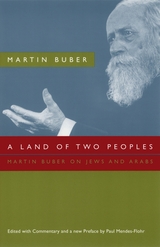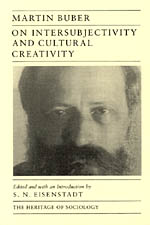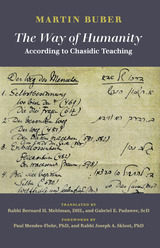3 books by Buber, Martin

A Land of Two Peoples
Martin Buber on Jews and Arabs
Martin Buber
University of Chicago Press, 2005
Theologian, philosopher, and political radical, Martin Buber (1878–1965) was actively committed to a fundamental economic and political reconstruction of society as well as the pursuit of international peace. In his voluminous writings on Arab-Jewish relations in Palestine, Buber united his religious and philosophical teachings with his politics, which he felt were essential to a life of public dialogue and service to God.
Collected in ALand of Two Peoples are the private and open letters, addresses, and essays in which Buber advocated binationalism as a solution to the conflict in the Middle East. A committed Zionist, Buber steadfastly articulated the moral necessity for reconciliation and accommodation between the Arabs and Jews. From the Balfour Declaration of November 1917 to his death in 1965, he campaigned passionately for a "one state solution.
With the Middle East embroiled in religious and ethnic chaos, A Land of Two Peoples remains as relevant today as it was when it was first published more than twenty years ago. This timely reprint, which includes a new preface by Paul Mendes-Flohr, offers context and depth to current affairs and will be welcomed by those interested in Middle Eastern studies and political theory.
Collected in ALand of Two Peoples are the private and open letters, addresses, and essays in which Buber advocated binationalism as a solution to the conflict in the Middle East. A committed Zionist, Buber steadfastly articulated the moral necessity for reconciliation and accommodation between the Arabs and Jews. From the Balfour Declaration of November 1917 to his death in 1965, he campaigned passionately for a "one state solution.
With the Middle East embroiled in religious and ethnic chaos, A Land of Two Peoples remains as relevant today as it was when it was first published more than twenty years ago. This timely reprint, which includes a new preface by Paul Mendes-Flohr, offers context and depth to current affairs and will be welcomed by those interested in Middle Eastern studies and political theory.
[more]

On Intersubjectivity and Cultural Creativity
Martin Buber
University of Chicago Press, 1992
One of the foremost religious and social philosophers of the twentieth century, Martin Buber also wrote extensively on sociological subjects, particularly as these affected his philosophical concerns. Collected here, these writings offer essential insights into the human condition as it is expressed in culture and society.
Buber's central focus in his sociological work is the relation between social interaction, or intersubjectivity, and the process of human creativity. Specifically, Buber seeks to define the nature and conditions of creativity, the conditions of authentic intersubjective social relations that nurture creativity in society and culture. He attempts to identify situations favorable to creativity that he believes exist to some extent in all cultures, though their fullest development occurs only rarely.
Buber considers the combination of open dialogue between human and human and a dialogue between man and God to be necessary for the crystallization of the common discourse that is essential for holding a free, just, and open society together.
Important for an understanding of Buber's thought, these writings—touching on education, religion, the state, and charismatic leadership—will be of profound value to students of sociology, philosophy, and religion.
Buber's central focus in his sociological work is the relation between social interaction, or intersubjectivity, and the process of human creativity. Specifically, Buber seeks to define the nature and conditions of creativity, the conditions of authentic intersubjective social relations that nurture creativity in society and culture. He attempts to identify situations favorable to creativity that he believes exist to some extent in all cultures, though their fullest development occurs only rarely.
Buber considers the combination of open dialogue between human and human and a dialogue between man and God to be necessary for the crystallization of the common discourse that is essential for holding a free, just, and open society together.
Important for an understanding of Buber's thought, these writings—touching on education, religion, the state, and charismatic leadership—will be of profound value to students of sociology, philosophy, and religion.
[more]

The Way of Humanity
According to Chasidic Teaching
Martin Buber
Central Conference of American Rabbis, 2023
Martin Buber (1878–1965) was one of the most influential Jewish
thinkers of the twentieth century. A philosopher, seeker, and nurturer of
dialogue, he responded to the complexities of his times by affirming the
fullness of interpersonal encounter and the spiritual everyday. In 1947,
Buber delivered lectures interpreting six traditional Chasidic stories
to a German-speaking audience, published as The Way of Humanity. In
the first new English translation in over half a century, Rabbi Bernard
H. Mehlman, DHL, and Gabriel E. Padawer, ScD, z"l, bring the work to
contemporary readers in a clear, accessible voice. The teachings within
highlight the subversion and innovation of the early Chasidic masters of
the eighteenth and nineteenth centuries, while providing meaningful
spiritual guidance and insight for any seeker today. Scholarly forewords
by Paul Mendes-Flohr, PhD, and Rabbi Joseph A. Skloot, PhD, as well
as an introduction, epilogue, and notes from the translators, place
Buber’s work in historical context. Timeless and enlightening, The Way
of Humanity guides us to inner meaning and highlights our human
wholeness.
thinkers of the twentieth century. A philosopher, seeker, and nurturer of
dialogue, he responded to the complexities of his times by affirming the
fullness of interpersonal encounter and the spiritual everyday. In 1947,
Buber delivered lectures interpreting six traditional Chasidic stories
to a German-speaking audience, published as The Way of Humanity. In
the first new English translation in over half a century, Rabbi Bernard
H. Mehlman, DHL, and Gabriel E. Padawer, ScD, z"l, bring the work to
contemporary readers in a clear, accessible voice. The teachings within
highlight the subversion and innovation of the early Chasidic masters of
the eighteenth and nineteenth centuries, while providing meaningful
spiritual guidance and insight for any seeker today. Scholarly forewords
by Paul Mendes-Flohr, PhD, and Rabbi Joseph A. Skloot, PhD, as well
as an introduction, epilogue, and notes from the translators, place
Buber’s work in historical context. Timeless and enlightening, The Way
of Humanity guides us to inner meaning and highlights our human
wholeness.
[more]
READERS
Browse our collection.
PUBLISHERS
See BiblioVault's publisher services.
STUDENT SERVICES
Files for college accessibility offices.
UChicago Accessibility Resources
home | accessibility | search | about | contact us
BiblioVault ® 2001 - 2024
The University of Chicago Press









